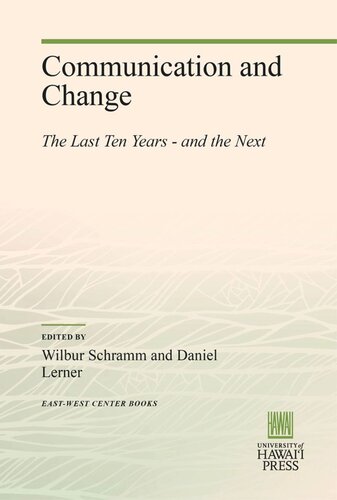

Most ebook files are in PDF format, so you can easily read them using various software such as Foxit Reader or directly on the Google Chrome browser.
Some ebook files are released by publishers in other formats such as .awz, .mobi, .epub, .fb2, etc. You may need to install specific software to read these formats on mobile/PC, such as Calibre.
Please read the tutorial at this link: https://ebookbell.com/faq
We offer FREE conversion to the popular formats you request; however, this may take some time. Therefore, right after payment, please email us, and we will try to provide the service as quickly as possible.
For some exceptional file formats or broken links (if any), please refrain from opening any disputes. Instead, email us first, and we will try to assist within a maximum of 6 hours.
EbookBell Team

5.0
20 reviewsIn the summer of 1964, a group of scholars, representing the psychological and social sciences, met at the East-West Center to discuss the use of communication in economic and social development. The revised papers of that conference became the book Communication and Change in the Developing Countries, edited by Lerner and Schramm, published in 1967 by the East-West Center Press, and circulated widely in several editions.
The discussion that began in Honolulu in 1964 has continued ever since, by mail and in person. To many of the participants in that conference it began to seem in the 1970s that new information on the topic was so substantial, and changes in the situation so marked, that the conclusions of the 1964 meeting should be reviewed after ten years. Thus it came about that in early January of 1975, a few months more than a decade since the earlier meeting, a second conference was convened in the same room at the East-West Center, under the same chairmen and with a number of the 1964 participants, who were joined by other scholars. The purpose was to assess what has been learned in ten years concerning the use of communication in development, the changing needs of developing countries for communication support, and new priorities for communication expertise, communication research, and modern communication technology.
Out of that 1975 meeting has come this volume.